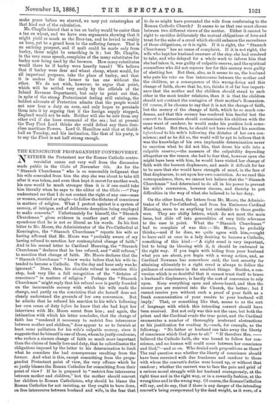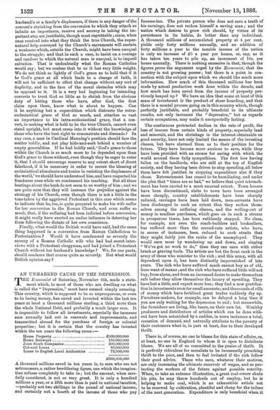THE KENSINGTON PROPAGANDIST CONTROVERSY. to do so might have prevented
the wife from conforming to the Roman Catholic Church ? It seems to WI that one must choose between two different views of the matter. Either it cannot be right to sacrifice deliberately the mutual obligations of love and trust for the sake of a creed which should enhance the sacredness of those obligations, or it is right. If it is right, the "Staunch Churchman" has no cause of complaint. If it is not right, the wife who kept her husband unaware of the step she had resolved to take, and who delayed for a whole week to inform him that she had taken it, was guilty of culpable reserve, and the spiritual counsellors who did not reprove her for this secrecy were guilty of abetting her. But then, also, as it seems to us, the husband who puts his veto on free intercourse between the mother and the children, as a consequence of this wrong-doing and this change of faith, shows that he, too, thinks it of far less import- ance that the mother and the children should stand to each other in the most tender relations, than it is that the children should not contract the contagion of their mother's Romanism. Of course, if he chooses to say that it is not the change of faith, but the secrecy of the change of faith, which he so much con- demns, and that this secrecy has rendered him fearful lest the convert to Romanism should contaminate his children with the same want of candour, he would make his position look some- what better. But then, he should not have refused his sanction beforehand to his wife's following the dictates of her own con- science; and as he did so, the world will be apt to believe that it was the knowledge of his own implacable determination never to sanction what he did not like, that drove his wife into a culpable reserve,—the measure of the culpability depending altogether on the reason she had to fear that, however open she might have been with him, he would have visited her change of faith with the keenest displeasure, and made it difficult for her to be sure that she would have strength of mind, in the face of that displeasure, to act upon her own conviction. As we read this correspondence, then, we cannot but believe that the "Staunch Churchman" had determined to do all in his power to prevent his wife's conversion, however sincere, and thereby to put difficulties in the way of what she believed to be her duty.
On the other hand, the letters from Mr. Moore, the Adminis- trator of the Pro-Cathedral, and from his Eminence Cardinal Manning, seem to us anything but creditable to those gentle- men. They are shifty letters, which do not meet the main issue, but slide off into generalities of very little relevance to the case in point. What the "Staunch Churchman" had to complain of was this :—Mr. Moore, he probably thinks,—and if he does, we quite agree with him,—ought to have said at once to a lady desiring to become a Catholic, something of this kind :---• A right creed is very important, but to bring its blessing with it, it should be embraced in the right way. If you begin with hiding from your husband what you are about, you begin with a wrong action, and, as Cardinal Newman has somewhere said, the best security for attaining ultimately to a right creed is always to follow the guidance of conscience in the smallest things. Besides, a con- version which is so doubtful that it cannot trust itself to brave a husband's displeasure, is hardly the sort of conversion to rely upon. Keep everything open and above-board, and then the sooner you are received into the Church, the better ; but I cannot receive you without such a proof of your faith as a frank communication of your resolve to your husband will imply.' That, or something like that, seems to us the sort of language with which this intending convert should have been received. But not only was this not the case, but both the priest and the Cardinal evade the true point, and the Cardinal enumerates a number of thoroughly irrelevant abstractions as his justification for evading it,—such, for example, as the following : "No father or husband can take away the liberty of conscience which God gives to all." "If therefore Mrs. — believed the Catholic faith, she was bound to follow her con- science, and no human will could come between her conscience and God,"—and so on. Who denied such propositions as these P The real question was whether the liberty of conscience should have been exercised with due frankness and candour to those with whom the convert's duties were bound up, or without that candour ; whether the convert was to face the pain and grief of a serious moral struggle with her husband courageously, at the right time and in the right way, or in a cowardly fashion, at the wrong time and in the wrong way. Of course, the Roman Catholics will say, and do say, that if there is any danger of the intending convert's being overpowered by the dead weight, as it were, of a husband's or a family's displeasure, if there is any danger of the convert's shrinking from the conversion to which they attach so infinite an importance, reserve and secrecy in taking the im- portant step are justifiable, though most regrettable ; since, when once received into what they think the true Church, the super- natural help conveyed by the Church's sacraments will sustain a weakness which, outside the Church, might have been unequal to the struggle; and that in such a case, to insist on a courage and candour to which the natural man is unequal, is to imperil salvation. That is undoubtedly what the ROM= Catholics would say ; but we confess that to us it has very little weight. We do not think so lightly of God's grace as to hold that if it be God's grace at all which leads to a change of faith, it will not be sufficient to effect that change without any sort of duplicity, and in the face of the moral obstacles which may be opposed to it. It is a very bad beginning for intending converts to trust God so little as to shrink from the obvious duty of letting those who have, after God, the first claim upon them, know what is about to happen. Can it be anything but a superstition which distrusts the extra- ecclesiastical grace of God so much, and attaches so vast an importance to his intra,-ecclesiastical grace, that a con- vert, in seeking what is held to be the true Church, cannot even stand upright, but must creep into it without the knowledge of those who have the best right to remonstrate and dissuade ? In any case, a man in Cardinal Manning's position should face the matter boldly, and not play hide-and-seek behind a number of empty generalities. If he had boldly said,' God's grace to those within the Church is so much more to be depended upon than God's grace to those without, even though they be eager to enter it, that I should encourage reserve to any extent short of direct falsehood, if it be necessary in order to secure the blessing of ecclesiastical stimulants and tonics in resisting the displeasure of the world,' we should have understood him, and have respected his frankness even while we condemned his teaching. But all these beatings about the bush do not seem to us worthy of him ; and we are quite sure that they will increase the prejudice against the strategy of his Church, even though there is not a little in the tone taken by the aggrieved Protestant in this case which seems to indicate that he, too, is quite prepared to make his wifa suffer for her conversion to the Roman Church, and even suffer so much, that, if the suffering had been inflicted before conversion, it might really have exerted an undue influence in deterring her from following the dictate of her own conscience.
Finally, what would the British world have said, had the same thing happened in a conversion from Roman Catholicism to Protestantism ? Would it have condemned as severely the secrecy of a Roman Catholic wife who had had secret inter- views with a Protestant clergyman, and had joined a Protestant Church without her husband's knowledge? We, for our parts, should condemn that course quite as severely. But what would British opinion say ?



































 Previous page
Previous page